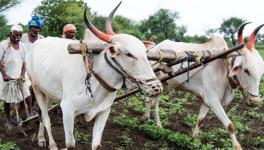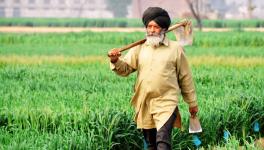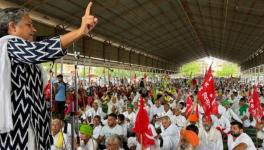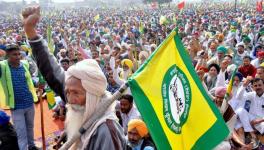Farmers Protest: Ambedkar, A Man of Many Struggles, Celebrated at Delhi's Borders

“How do you see him? If you see him merely as the leader of Dalits, I think you are doing a gross injustice to his contributions. He drafted laws providing social security for workers. He made laws enabling an equal share of property for women. How can we reduce him to his mere caste identity!” The opening remarks by one of the speakers at the main stage of the Samyukta Kisan Morcha at Singhu Border set the tone for rest of Ambedkar Jayanti on Wednesday.
Darshan Nahar, president of the Dehati Majdoor Sabha, who came with his comrades from Punjab, said that many members from the Dalit community are under the wrong impression that the three Farm Laws would only affect farmers.
Speaking to Newsclick, he said, ”as a matter of fact, we must remember that the first casualty of these laws would be the Public Distribution System and National Rural Employment Guarantee Scheme through which Dalit workers find their food and work. For example if The Essential Commodities (Amendment) Act, 2020 comes into force, it would lead to hyper-inflation. The basic commodities, which we hardly get anyway, would be out of reach. So, it is our duty to oppose these laws more than any other community or section of society. We are travelling across Punjab to create awareness about the laws among Dalits. However, the government, through the RSS and BJP workers, is creating confusion by saying the farmers' land would be redistributed among workers. This is a plain lie because they did not implement land ceiling act which put a bar on the ownership of land. I think it is our duty to be two steps ahead of the farmers in their struggle.”
Prominent professor and activist Manjit Singh told Newsclick that the "optics" of the movement has changed immensely in more than four months, and has become a melting pot of ideologies which has forged a common consensus. "When we came to the Singhu Border when the movement began it did not appear to be one. Now, it looks like one where the youth, women and members of the Dalit community today came as a united force, putting their differences aside, because they too have recognised that it is probably the biggest assault on people who have been dependent on land for their livelihood.”
Kuljeet Kaur, a teacher from Punjab, gave a history lesson to a curious audience when she talked about the women code bill and the contribution of Ambedkar in defending women’s rights. “Just look at the amount of moral courage the man had when he stood steadfast in the face of mounting opposition when he talked about an equal share for women in ancestral property. People had stopped talking to him. Despite this, he continued his work,” she said.
Samyukta Kisan Morcha – a collective of farmers’ unions – said that the federal structure of the constitution was under assault because the Modi government did not care if the laws were encroaching on the limits of states. In a press statement, it said, "the present government and the RSS-BJP are manipulating and destroying the Constitution in the name of reforms. This pattern is dangerous for both the economy and society. Agriculture is a state subject, it is definitely an unconstitutional step that the union government is making a law on it. At the same time, the BJP-RSS taking over various institutions is a threat to the future of India. People have been opposing these anti-constitutional forces earlier as well. The present farmers' movement has not only tried to save the Constitution but it is another effort to fight for the strong implementation of the Constitution.”
The "three agricultural laws were introduced by the Central Government at the time of the Corona pandemic without any dialogue, consultation and demand. The marketing system and proper MSP is the biggest freedom for farmers. In the same way, the minimum wage and respectful work by the workers protect them from exploitation. At present, both these sections have been targeted by the Central Government. Farmers and labourers are also united against the corporate-government nexus. The government is implementing a policy of 'divide and rule' by dividing the working class among several castes. Not only the Essential Commodities Amendment Act, but the other two farm laws, will affect the economy of Dalit Bahujans broadly. Today labourers and farmers understand this well and they are fighting united against these policies.”
After mounting pressure from Khaps and farmers organisations, Haryana Chief Minister Manohar Lal Khattar canceled a programme in Badauli, Sonipat, where he was slated to inaugurate the statue of Ambedkar. The farmers' and Dalit organisations had called for opposing the programme as it was seen creating a rift between Dalits and other communities.
Get the latest reports & analysis with people's perspective on Protests, movements & deep analytical videos, discussions of the current affairs in your Telegram app. Subscribe to NewsClick's Telegram channel & get Real-Time updates on stories, as they get published on our website.
























